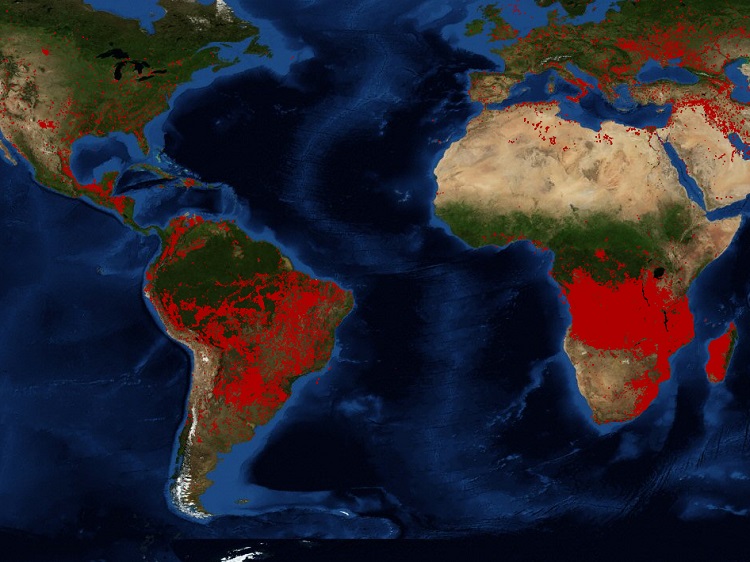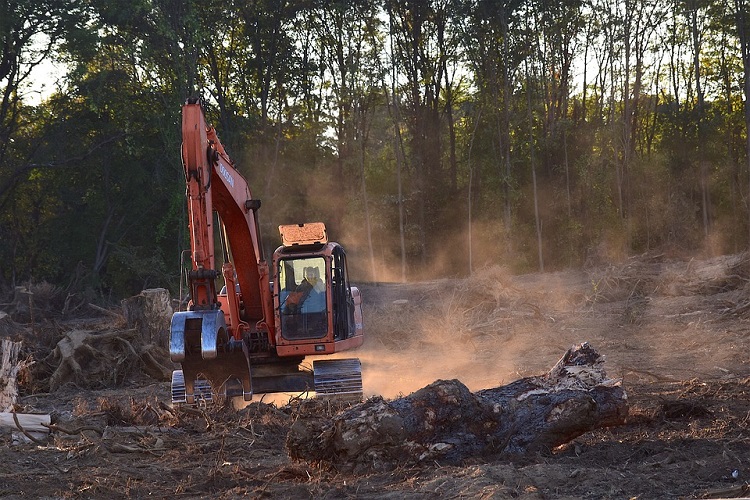
Huge swathes of tropical forests are burning in Africa and the Amazon. These forests are home to indigenous peoples, they are vital habitats for animals and plants, and they are important absorbers of carbon dioxide. Forests are increasingly under pressure as global demand grows for food, fuel and fibre. Markets generally do not attach a value to the social and environmental benefits that forests provide; short-term economic gains from degrading or converting forests are greater than those from leaving them standing.
About a quarter of global greenhouse gas emissions are the result of deforestation, unsustainable agriculture and other land uses, so forest protection and sustainable agriculture are key to tackling global heating and the climate crisis. How can we protect and restore forests and achieve more sustainability in agriculture, on the massive scale that is needed? Researchers and practitioners in international development are working on innovations and strategies that support forest protection and restoration, including efforts to tackle a key cause of deforestation – agribusiness expansion in soy, cocoa, palm oil, rubber and beef. But how effective are these strategies?
and the climate crisis. How can we protect and restore forests and achieve more sustainability in agriculture, on the massive scale that is needed? Researchers and practitioners in international development are working on innovations and strategies that support forest protection and restoration, including efforts to tackle a key cause of deforestation – agribusiness expansion in soy, cocoa, palm oil, rubber and beef. But how effective are these strategies?
Valerie Nelson, Professor of Sustainable Development, and colleagues from NRI are conducting studies to help answer these questions. One example is their work as part of an independent evaluation team linked to the ‘Partnerships for Forests’ (P4F) programme, funded by the UK’s Department for International Development (DFID). P4F’s focus is on catalysing investments in which the private sector, public sector and communities can achieve shared value from sustainable forests and land use.
 They do this by providing grant finance and technical assistance to generate ideas on, and to act as an incubator for new business or investment models as alternatives to ‘business as usual’ in land use, supporting partnerships in West and Central Africa, East Africa, Southeast Asia and Latin America. The aim is for the partnerships to deliver on commitments for deforestation-free commodities, reduce the pressure on forests, and improve livelihoods by 2020.
They do this by providing grant finance and technical assistance to generate ideas on, and to act as an incubator for new business or investment models as alternatives to ‘business as usual’ in land use, supporting partnerships in West and Central Africa, East Africa, Southeast Asia and Latin America. The aim is for the partnerships to deliver on commitments for deforestation-free commodities, reduce the pressure on forests, and improve livelihoods by 2020.
PF4 supports many highly innovative ideas and partnerships and seeks to assist existing initiatives to scale up. However, more research is needed to know if the strategies they promote are effective, and for whom, and to explore the potential risks of such initiatives exacerbating forest losses, rather than preventing them. The evaluation team, led by development consulting firm LTS International and in collaboration with AidEnvironment, has been conducting studies to inform overall programme strategy, and for policymakers, researchers, DFID and other donors, and practitioners.
Three studies have been undertaken which look closely at the main intervention strategies of the programme. For example, one study has explored projects and partnerships which seek to add economic value to forests by supporting the development of new forest products that are high in value, with low production intensity, such as wild honey, brazil nuts and dragon’s blood fruit. Such initiatives seek to deliver benefits for both producers and buyers, which in turn incentivize their protection.
forests by supporting the development of new forest products that are high in value, with low production intensity, such as wild honey, brazil nuts and dragon’s blood fruit. Such initiatives seek to deliver benefits for both producers and buyers, which in turn incentivize their protection.
Other strategies include ‘Sustainable Landscapes Initiatives’, which work with all the diverse groups in a particular forest landscape, to build capacity, institutions and incentives. These Initiatives change the rules governing the use of and access to land and natural resources in the landscape. They also seek to change the business dynamics in the landscape with the aim of creating a shift away from damaging types of agri-commodity production toward forest protection and restoration and more sustainable and intensified agricultural production. Another strategy is developing business models in which large numbers of individual smallholders are engaged in commercial forestry or climate smart agriculture, for example through increased access to credit.
The study findings highlight the complexity of forest-landscape system drivers, values and interests. Tackling deforestation requires simultaneous sets of behaviour and institutional change within the landscape amongst smallholders, local and indigenous communities, local and national governments and private sector producers, processors, importers and buyers.
Across all three strategies there is an urgent need for enhanced capacity strengthening of smallholder organisations in their governance and business capacity, more focus on community land rights, on-going monitoring and evaluation in each specific landscape to ensure positive outcomes and to avoid risks of exacerbating deforestation. The results also find that ‘sustained political support’ is a key ingredient for any of the partnerships and strategies promoted by the P4F programme.
To read more, see the three detailed studies, a briefing, and a synthesis report. Further studies by the evaluation learning team are already underway, including rubber and ecosystem restoration concessions in Southeast Asia, cocoa in West Africa and palm oil in West Africa, with a Latin American study planned for 2020. Findings will begin to emerge from field studies in early 2020.
To find out more about:
Sustainable Trade and Responsible Business Programme
Thematic Study: High Value, Low Intensity Value Chains in Forest Landscapes
Thematic Study: Creating Value through Restoration
Catalysing private sector investment in sustainable forestry and land use: Lessons from evidence and emerging practice: A Synthesis Report
Thematic Study: Produce-Protect initiatives in Forest Landscapes

